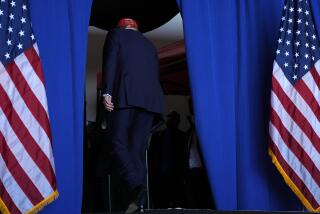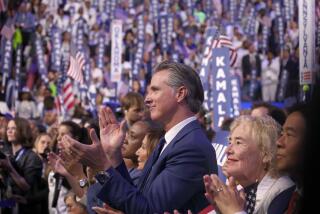NEWS ANALYSIS : Bush Still Looks Like Lock for GOP : Politics: It appears that only a monumental failure such as a scandal, ‘losing his cool’ or fouling up in a debate could disrupt his momentum, observers say.
- Share via
AUSTIN, Texas — Not long ago, back when George W. Bush was a mere governor and not a Goliath, experts had the Republican presidential race all figured out. With no clear front-runner, the pundits declared the GOP nomination up for grabs and forecast the most wide-open contest in decades.
They couldn’t have been more wrong.
Less than three months after first planting his cowboy boots on the campaign trail, Texas Gov. Bush is running so far ahead of the pack that many analysts are ready to proclaim the race over--before a single vote is cast.
Which begs a question as the campaign enters its intensive post-Labor Day phase: Who’s to say the know-it-alls aren’t wrong again?
There’s no question Bush enjoys certain clear-cut advantages as the campaign moves toward the winter’s first meaningful contests in Iowa and New Hampshire. To fall short now would require “some monumental candidate failure,” said Rich Bond, a former chairman of the Republican National Committee and Bush backer. “Some old scandal, some new scandal, screwing up in a debate or losing his cool.”
But any one of those could certainly happen. After all, Bush has only been in public office five years and never run outside the comfortable confines of Texas. His shaky performance addressing recent questions about his roisterous past has caused some concern within GOP circles. Moreover, Bush has benefited from no small amount of luck, which could run out tomorrow.
“There’s an undercurrent of nervousness out there,” said William Kristol, a Republican tactician and editor of the Weekly Standard, a conservative journal. “While he looks good and he’s ahead in the polls, people don’t really know that much about him. It’s not like he’s really been tested.”
That’s about to change.
Don Sipple, a GOP strategist and onetime Bush advisor, says that “when you get into the nitty-gritty of issues, his broad appeal will be put to a test. The question then becomes whether ‘electability’ can overcome Republicans’ ideological divisions.”
Already, magazine publisher Steve Forbes has stepped up his criticism of Bush after finishing second in the recent Iowa straw poll, detailing plans on a range of issues--from tax cuts to medical savings accounts--designed to appeal to the party’s core conservatives. Other rivals, meantime, have sharpened their attacks on such emotional issues as abortion, which the governor has largely ignored up to now.
“As we start turning to the fall campaign, it’s going to be defined by issues,” asserted Greg Mueller, a Forbes spokesman. “Bush doesn’t really have an issues agenda, and that’s the greatest vulnerability of his candidacy.”
While hardly conceding the point, the Bush camp recognizes a “need to color in the details,” said strategist Karl Rove. As such, a series of speeches on education, defense and economic issues is scheduled between now and the end of the year.
Still, the meteoric rise of candidate Bush points to certain strengths that should continue to boost his campaign. The past isn’t necessarily prologue, but it’s not a bad place to start trying to discern where the race may be headed.
In reality, the GOP contest was never as wide-open as many supposed, even without an obvious heir apparent, the way Ronald Reagan was in 1980, Bush’s father was in 1988 or Bob Dole was four years ago. From the beginning, the junior Bush enjoyed certain inherent advantages over the crowded field of contestants, starting with his famous name and Texas-size fund-raising base, which virtually guaranteed the ability to raise the estimated $20 million needed to wage a serious campaign (indeed, he’s broken records with the $50 million--and climbing--he’s raised so far).
On top of all that, Bush got lucky.
His biggest break came while he was still focused on last year’s reelection campaign, when retired Army Gen. Colin L. Powell, perhaps the most formidable Republican out there, said he would not seek the White House in 2000. Bush lucked out again when other Republican governors with longer, arguably more impressive records--most notably Michigan’s John Engler and Wisconsin’s Tommy G. Thompson--opted out of the race for want of sufficient resources.
That gave the Texas governor the advantage of being the only state executive running at a time when many Republicans were seeking someone outside the Beltway to distance the party from its discredited congressional wing. “A lot of Republican Party activists did not want a nominee whose name begins with ‘Congressman’ or ‘Senator,’ ” said GOP strategist Ed Gillespie. The sentiment was particularly prevalent after the GOP lost House seats in 1998, which many blamed on the antagonism embodied by former Speaker Newt Gingrich and the combative cadres behind President Clinton’s impeachment.
The Bush name, on the other hand, was a brand that Republicans knew and trusted.
Few outside Texas could cite Bush’s accomplishments as governor, even on signature issues like improving public education and overhauling the state legal system. But wherever he traveled, the Bush reputation preceded him.
“Our core primary voters feel they know Gov. Bush,” said William McInturff, a GOP pollster and advisor to Sen. John McCain of Arizona, another GOP presidential hopeful. “They say, ‘I know George and Barbara Bush, I know their core values. . . . You can’t be raised by George and Bar and not leave that household without certain values, values I know and respect.”
There was also Republican remorse, a feeling, as Mueller put it, that loyalists “maybe should have been a little more enthusiastic in supporting President Bush, given what we’ve lived with these past eight years.” Even some Democrats seemed to share the sentiment; consider a Gallup Poll in June that found a 70% approval rating for ex-President Bush--who was turned out of office in 1992 when he got just 37% of the vote.
But Gov. Bush did more than capitalize on his political pedigree. He deliberately set out to build an independent identity, as a “compassionate conservative,” and an independent base of support, with considerable help from his fellow GOP governors. The purpose was twofold: to prove he was his own man and to distance himself from the failings of the last two Republican presidential campaigns. Said Bush strategist Rove: “It sent a message. If you were disappointed with the outcome in ’92 and ‘96, this time there will be a different team on the field.”
In fact, although a number of old hands from the Bush White House have signed on with the governor’s campaign, most have played low-profile, behind-the-scenes roles. Among donors, only a relatively small percentage of the governor’s contributors were supporters of his father’s 1988 and 1992 presidential campaigns.
Of course, Bush is hardly a newcomer to national politics.
An inveterate extrovert, more inclined than his father ever was to hug a supporter or dive to shake an outstretched hand, the junior Bush has benefited from years of what amounted to on-the-job presidential campaign training.
“He practically grew up an operative,” said former GOP Chairman Bond, who first got to know George W. Bush 20 years ago, when they shared a car and crisscrossed Iowa during the senior Bush’s first (unsuccessful) presidential campaign. “You don’t have to explain who each state’s national [Republican] committee member is, what they do, how many each state has. He already knows a ton of people, from operatives to elected officials.”
Bush’s easygoing familiarity and his peers’ comfort with the governor on a personal level help explain why so many Republican insiders were willing to enlist in his effort, even though Bush has never sought national office. “There’s no great mystery,” said McInturff, who helped elect several Republican governors. “He’s a good-natured, good-humored guy who genuinely enjoys schmoozing and being with people. The other governors really like him.”
Even more, they like winning, and in the self-perpetuating way that politics can work, Bush’s initial success begat more success: His strong showing in early polls (a function of name recognition) helped garner endorsements (in a ritual carefully orchestrated from Austin), which spurred fund-raising and intensified media coverage, which buoyed Bush’s support in polls, which led to more endorsements and more contributions.
At this point, the question is how--and whether--Bush’s rivals can break that serendipitous cycle.
For most of the Republican field, it’s a matter of waiting: for Bush to stumble or implode, for Bush’s luck to turn sour, for Forbes’ vast fortune to cut the front-runner down to size, for some unforeseen event to turn the GOP contest from a romp into a race.
“There’s still debates to go through, advertising to be run, caucuses to come,” said strategist Gillespie, whose preferred candidate, Rep. John R. Kasich of Ohio, has already fallen by the wayside.
“Steve Forbes and Elizabeth Dole and John McCain and Dan Quayle aren’t going to roll over. . . . No number of elected officials and donors and state party chairmen are enough to confer the nomination. Only the voters can do that.”
More to Read
Get the L.A. Times Politics newsletter
Deeply reported insights into legislation, politics and policy from Sacramento, Washington and beyond. In your inbox twice per week.
You may occasionally receive promotional content from the Los Angeles Times.











